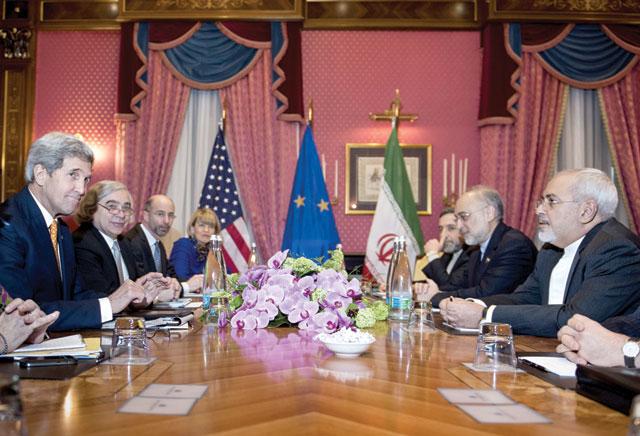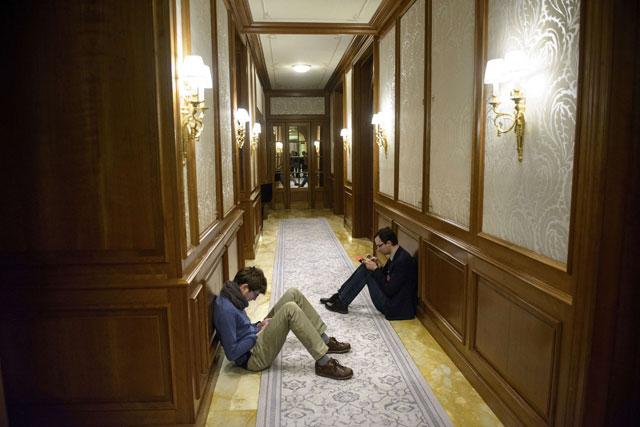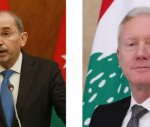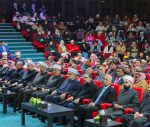You are here
Iran, powers explore nuclear compromises; Israel alarmed
By Reuters - Mar 29,2015 - Last updated at Mar 29,2015
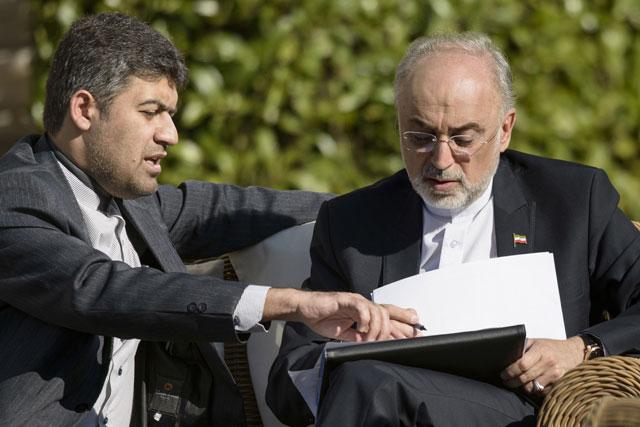
LAUSANNE, Switzerland — Iran and six world powers tried to break an impasse in nuclear negotiations on Sunday, but officials cautioned that attempts to reach a preliminary deal by a deadline in two days could yet fall apart.
The two sides explored compromises in areas including numbers of centrifuges used to enrich uranium that Iran could operate, and its nuclear enrichment work for medical research.
But Israel, which feels especially threatened by the possibility of a nuclear-armed Iran, said the details of a possible framework agreement emerging from the talks in the Swiss city of Lausanne were even worse than it feared.
The six powers — the United States, Britain, France, Germany, Russia and China — want at least a 10-year suspension of Iran's most sensitive nuclear work. Tehran, which denies it trying to develop a nuclear weapons capability, is demanding an end to international sanctions that are crippling its economy.
Officials warned that deep disagreements remained over several sticking points in Lausanne. Nevertheless, they said that in recent days the two sides have been closing in on a preliminary deal that could be summarised in a brief document of several pages that may or may not be released.
Several officials told Reuters that Tehran had indicated a willingness to cut the number of centrifuges it uses to fewer than 6,000, thereby slowing its programme, and to send most of its enriched uranium stockpiles for storage in Russia.
Western powers, on the other hand, were considering the idea of allowing Iran to conduct limited, closely-monitored enrichment-related work for medical purposes at an underground facility, the officials added on condition of anonymity.
Iran had originally insisted on keeping in operation the nearly 10,000 centrifuges it currently uses, but said in November that Washington indicated it could accept around 6,000. Iranian officials say they had been pushing for 6,500-7,000.
All parts of an emerging nuclear deal are interrelated. "Everything could still fall apart," a Western official told Reuters, adding that the talks could drag on to Tuesday, the self-imposed deadline for a framework agreement.
Iranian Deputy Foreign Minister Abbas Araqchi also said the outcome was uncertain. "All sides are working hard to resolve remaining issues but there is still a long way to go," he told reporters.
German Foreign Minister Frank-Walter Steinmeier warned that the stakes were high. "I can't rule out that there will be further crises in these negotiations," he told reporters.
A main sticking point is Iran's demand that it continue with research into a new generation of advanced centrifuges. These machines can purify uranium faster and in greater quantities for use in nuclear power plants or, if very highly enriched, in weapons.
Another question is over the speed of removing United Nations sanctions on Iran. A senior US official said there were unresolved questions on other issues but expected those would fall into place if the big sticking points could be worked out.
The US official added that the negotiators were working towards something that would be called an "understanding", as opposed to a formal agreement.
Such a deal would form the basis of a comprehensive deal, including all technical details, to be tied up by June 30.
The powers' aim is to ensure that Iran is kept at least one year away from the ability to produce enough fissile nuclear material for a single weapon for at least 10 years.
Israel furious
"We're hopeful, but there is still a lot of work to be done," French Foreign Minister Laurent Fabius told reporters on Sunday. His remarks contrasted to hostility from Israel, which is believed to have the Middle East's only nuclear arsenal but is not a party to the talks.
"This deal, as it appears to be emerging, bears out all of our fears, and even more than that," Prime Minister Benjamin Netanyahu told his Cabinet in Jerusalem.
Netanyahu referred to advances made by Houthi rebels allied to Tehran in Yemen, and accused the Islamic republic of trying to "conquer the entire Middle East".
"The Iran-Lausanne-Yemen axis is very dangerous to humanity, and must be stopped," he said.
In the past, Israel has threatened to attack Iran if it is not happy with an eventual deal and has long described France as the negotiating power with a position closest to its own, a view confirmed by officials close to the talks.
Chinese Foreign Minister Wang Yi, who met Fabius in Lausanne on Sunday, said there was now positive momentum towards a comprehensive agreement. However, "some outstanding differences remain obstacles in the negotiation process," his ministry quoted him as saying.
Fabius, Steinmeier and US Secretary of State John Kerry have all canceled travel plans so they could remain in Lausanne to continue the talks at a ministerial level. If there is a deal, the talks may shift to Geneva for the announcement.
Their Russian and British counterparts are expected in Lausanne soon.
Related Articles
The foreign ministers of France and Germany joined the top US and Iranian diplomats on Saturday to help break an impasse in nuclear negotiations as major powers and Iran closed in on a 2- or 3-page accord that could form the basis of a long-term deal.
The United States and Iran resumed negotiations on Thursday aimed at clinching a nuclear deal before a March 31 deadline, and officials close to the talks said some kind of preliminary agreement between Tehran and six powers was possible.
The United States said it was prepared to work past a midnight deadline into Wednesday if progress was being made towards clinching a preliminary nuclear deal between Iran and global powers.


